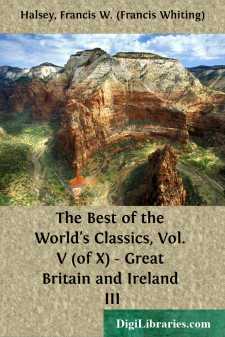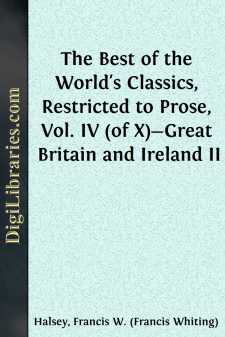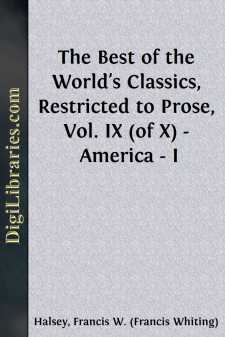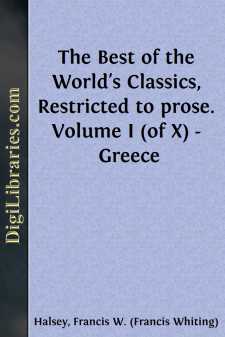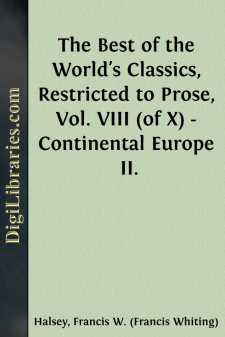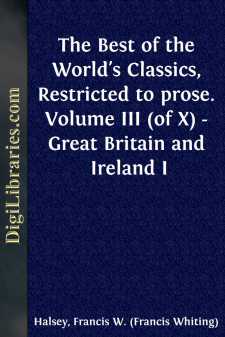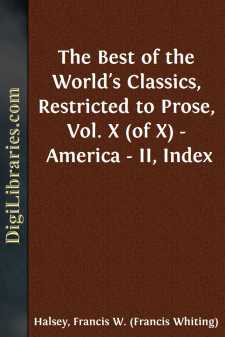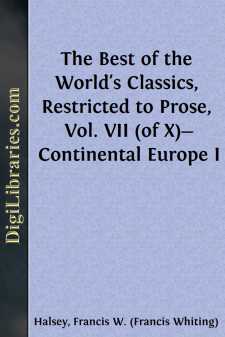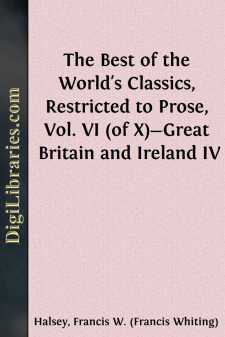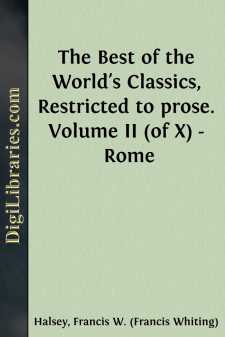Categories
- Antiques & Collectibles 13
- Architecture 36
- Art 48
- Bibles 22
- Biography & Autobiography 813
- Body, Mind & Spirit 142
- Business & Economics 28
- Children's Books 17
- Children's Fiction 14
- Computers 4
- Cooking 94
- Crafts & Hobbies 4
- Drama 346
- Education 46
- Family & Relationships 57
- Fiction 11829
- Games 19
- Gardening 17
- Health & Fitness 34
- History 1377
- House & Home 1
- Humor 147
- Juvenile Fiction 1873
- Juvenile Nonfiction 202
- Language Arts & Disciplines 88
- Law 16
- Literary Collections 686
- Literary Criticism 179
- Mathematics 13
- Medical 41
- Music 40
- Nature 179
- Non-Classifiable 1768
- Performing Arts 7
- Periodicals 1453
- Philosophy 64
- Photography 2
- Poetry 896
- Political Science 203
- Psychology 42
- Reference 154
- Religion 513
- Science 126
- Self-Help 84
- Social Science 81
- Sports & Recreation 34
- Study Aids 3
- Technology & Engineering 59
- Transportation 23
- Travel 463
- True Crime 29
Francis W. (Francis Whiting) Halsey
Francis Whiting Halsey (1851-1919) was an American journalist, editor, and author known for his contributions to literature and history. He served as an editor for "The New York Times" and authored several works, including "The Literary Digest History of the World War." Halsey's career was marked by his dedication to enhancing public understanding of historical and literary topics through his editorial and writing endeavors.
Author's Books:
Sort by:
BOSWELL'S INTRODUCTION TO DR. JOHNSON Mr. Thomas Davies the actor, who then kept a bookseller's shop in Russell street, Covent Garden, told me that Johnson was very much his friend, and came frequently to his house, where he more than once invited me to meet him; but by some unlucky accident or other he was prevented from coming to us. Mr. Thomas Davies was a man of good understanding and...
more...
OF COMPANIONS AND FLATTERERS An old acquaintance who met me this morning seemed overjoyed to see me, and told me I looked as well as he had known me do these forty years; but, continued he, not quite the man you were when we visited together at Lady Brightly's. Oh! Isaac, those days are over. Do you think there are any such fine creatures now living as we then conversed with? He went on with a...
more...
JOHN SMITH Born in England in 1579, died in 1631; served against the Turks, captured, but escaped and returned to England in 1605; sailed for Virginia in 1606, and helped to found Jamestown; captured by Indians and his life saved by Pocahontas the same year; explored the Chesapeake to its head; president of the Colony in 1608; returned to London in 1609; in 1614 explored the coast of New England;...
more...
INTRODUCTION Ever since civilized man has had a literature he has apparently sought to make selections from it and thus put his favorite passages together in a compact and convenient form. Certain it is, at least, that to the Greeks, masters in all great arts, we owe this habit. They made such collections and named them, after their pleasant imaginative fashion, a gathering of flowers, or what we,...
more...
THE TYRANNY OF THE AMERICAN MAJORITY I hold it to be an impious and execrable maxim that, politically speaking, the people has a right to do whatever it pleases; and yet I have asserted that all authority originates in the will of the majority. Am I then in contradiction with myself? A general law, which bears the name of justice, has been made and sanctioned not only by a majority of this or that...
more...
RICHARD DE BURY Born in 1281, died in 1345; the son of Sir Richard Aungerville, his own name being taken from his birthplace, Bury St. Edmonds; educated at Oxford, and became a Benedictine monk; tutor to Edward III; dean of Wells Cathedral in 1333; bishop of Durham the same year; high chancellor of England in 1334; founded a library at Oxford; his "Philobiblon" first printed at Cologne in 1473....
more...
The cemetery of Père Lachaise is the Westminster Abbey of Paris. Both are the dwellings of the dead; but in one they repose in green alleys and beneath the open sky—in the other their resting place is in the shadowy aisle and beneath the dim arches of an ancient abbey. One is a temple of nature; the other a temple of art. In one the soft melancholy of the scene is rendered still more touching by the...
more...
IMPERIAL POWER FOR GOOD AND BAD MEN Let us examine the nature of the spaciousness and continuance of empire, for which men give their gods such great thanks; to whom also they exhibited plays (that were so filthy both in actors and the action) without any offense of honesty. But, first, I would make a little inquiry, seeing you can not show such estates to be anyway happy, as are in continual wars,...
more...
THE BEGINNINGS OF TRACTARIANISM During the first years of my residence at Oriel, tho proud of my college, I was not quite at home there. I was very much alone, and I used often to take my daily walk by myself. I recollect once meeting Dr. Copleston, then Provost, with one of the Fellows. He turned round, and with the kind courteousness which sat so well on him, made me a bow and said, Nunquam minus...
more...
CATO, THE CENSOR Born in Tusculum, Italy, in 234 b.c., died in 149; celebrated as statesman, general, and writer; questor under Scipio in 204; Consul in 195; served in Spain in 194; censor in 184; ambassador to Carthage in 150; one of the chief instigators of the third Punic war; among his writings are "De Re Rustica" and "Origines." OF WORK ON A ROMAN FARM When the owner of the farm...
more...


